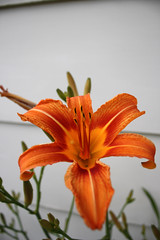Thoughts and advice on surviving seasonal allergies
 I never had seasonal allergies until I moved to Georgia. I always figured it was something I’d grown into, as it seemed to get worse the older I got. (I was out sick for a week my senior year of high school because the spring pollen orgy, and I found myself heading to the doctor 4+ times a year with allergy-induced tonsillitis during my first three years in college.) Aside from allergies, I don’t get sick much at all. But pollen and mold can turn me into a useless lump of flesh and mucus for weeks at a time. Over time, I’ve devised and discovered various ways of coping, and lately, I’ve gained some further insight into why I’d always get so sick.
I never had seasonal allergies until I moved to Georgia. I always figured it was something I’d grown into, as it seemed to get worse the older I got. (I was out sick for a week my senior year of high school because the spring pollen orgy, and I found myself heading to the doctor 4+ times a year with allergy-induced tonsillitis during my first three years in college.) Aside from allergies, I don’t get sick much at all. But pollen and mold can turn me into a useless lump of flesh and mucus for weeks at a time. Over time, I’ve devised and discovered various ways of coping, and lately, I’ve gained some further insight into why I’d always get so sick.
Recently, I discovered something shocking: my allergies really aren’t that bad. In the past year or so, I’ve been able to stay off of antihistamines entirely, with the exception of the few weeks in late September/early October and the March-May period that see pollen counts that really make me question the standard scale for pollen counts. (For those of you not familiar with Georgia’s allergy season, it’s not unusual to see pollen counts in well in excess of 1,000, when the standard scale starts counting “very high” at 151.) Even crazier than my ability to tolerate life without the daily regimen of obscure prescription allergy medication that has been the only thing that’s kept me functional during allergy season since 2003, I can suddenly tolerate most days during pollen season whilst taking Loratadine, which I’d thought stopped working for me when I was 15.
It occurred to me that on days where the pollen count is on the low end of “very high” (you know, the regular “very high” of maybe 200-300 that most other places see for a few days each year), I’ve never felt as bad as on days where the pollen count is in the range of “omgplantorgy.” That said, my allergies probably aren’t that bad. I’d figure that just about everyone would feel like death warmed over on a day where the pollen count exceeds 2,000. Nonetheless, I still suffered episodes of allergic rhinitis during periods where the allergy index was low until very recently.
So what changed?
I thought long and hard about this for about the past year, trying to come up with significant differences in my lifestyle and environment that were a possibility, and tested them where I could. The best explanation I could come up with was secondary allergens, particularly, mold. Now, I’ve known for years that when the mold count is up, I feel like crap. But again, it hadn’t been affecting me nearly as badly recently as it used to. I considered the idea that I was just growing out of it until I spent a night at my parents’ house, where I lived from the time I was 9 until I was 18. Though the allergy index was low, I woke up feeling like hell. I honestly hadn’t woken up feeling like that in quite some time, at least not in the middle of December. Then it occurred to me: the places I’d been living until about 3 years ago all had mold problems.
So what insight does all of this provide for other people with seasonal allergies (or chronic allergic rhinitis)? First of all, I would consider the idea that you’re being double- or triple-teamed with allergens. If you can eliminate or significantly reduce one, you might feel a lot better. I can also offer a number of other suggestions that really help me during allergy season:
- If possible, any time you come inside from being outside for more than a few minutes (this includes if you’ve been in a car), rinse your face with cool water, focusing on rinsing out your nose and eyes.
- Irrigate your sinuses as needed with saline nasal spray or a neti pot.
- Invest in some allergy eye drops. Use as directed.
- Find at least two allergy medications that work for you and figure out which is the more powerful one. Save that one for when you’re going to be inundated with multiple allergens (like pollen+mold or pollen+animal dander, assuming you’re not getting double-teamed all the time), and take the weaker one the rest of the time.
- Drink lots of water. It’s good for you anyway, and there’s no point in making yourself feel worse by being dehydrated.
- If the pollen count is high enough to bother you, don’t sit on upholstered furniture or lay on your bed in clothes you’ve been wearing outside. Likewise, take your shoes off while you’re inside. You don’t want to track more allergens into your home than necessary.
- If you can, get an air purifier. They make all the difference in the world, even the cheap ones and the ones that reportedly “don’t work” like the Ionic Breeze and similar.
(Keep in mind that the above is based on personal experience only. I am not a doctor and this is not intended to be taken as medical advice.)


Loratadine doesn’t do anything for me, as I’ve found out in the past 2 weeks. Cetirizine hydrochloride for the win 😛
Yeah, it didn’t work for me for the longest time. I have a prescription for a chlorpheniramine-based allergy medication that is my \strong\ antihistamine. It’s an old medication, but it works really well.
Hillary,
Thanks so much for the tips about miminizing pollen. I’m blogging about the same thing today and I think my readers will love what you have to say.
catherinecarey.wordpress.com
Catherine